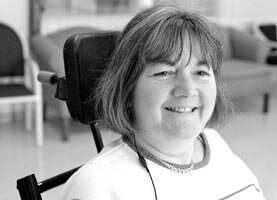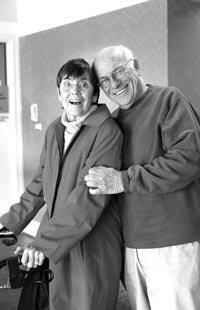'Our only hope': ALS patients get drug
Ten months after UVA pulled the plug on an experimental drug study for the devastating neurodegenerative disease ALS, the study's surviving original participants have resumed treatment. It's too late for the several who have died since the study ended, but it's not a moment too soon for those still hanging on.
"We've lost a lot of ground," says Eli Nicola of his wife, Bev, who has ALS and was hospitalized with pneumonia for two weeks in September. Though Bev was further weakened by the pneumonia and has lost the ability to stand even for short periods, the pair drove up from Richmond on Friday, September 30 so Bev could have the study's required blood tests and pick up a week's worth of the medication.
Crozet resident Preston Gentry had hoped to be making a similar trip with his wife, Mary Jane, a 47-year-old former UVA nurse who was diagnosed with a particularly aggressive case of ALS in August 2003. As she revealed in the Hook's February 24 cover story, "She's Dying: His drug could save her," Gentry believed the UVA study could answer her prayers for an effective treatment for a disease that invariably leads to paralysis and death. Unfortunately, the disease moved faster than the approval process, and Mary Jane died May 26, never having had the chance to resume treatment.
When she learned in May about another delay that would block her access to the medication, says her husband, "It was like she just gave up."
Like nearly half of the study's original 15 participants, both Gentry and Nicola had reported slight but noticeable improvement in their conditions during the eight weeks they received the drug in 2004. The disease had affected Nicola's ability to speak and swallow, but after several weeks, she says, she was able to articulate a few words. She also regained enough strength to climb stairs, something she had lost the ability to do. Gentry regained use of her right hand, which had been crippled by the disease for several months.
Because ALS, commonly called Lou Gehrig's Disease, is a debilitating illness with no known cure– or effective treatment– UVA's study, run by neurologist James Bennett, was received with enthusiasm by the ALS community.
Bennett, who through UVA spokesperson Peter Jump declined comment for this article, hypothesized that much of the nerve damage in ALS is caused by free radicals released during normal cell function. If he could find a chemical compound that would absorb free radicals, Bennett posited, he might slow the progression of the illness.
Bennett found pramipexole, the chemical mirror image of a Parkinson's drug called Mirapex. While both drugs act as free radical scavengers, Mirapex causes side effects including nausea and psychosis. Pramipexole, he believed, would not cause the same problems.
By summer 2004, Bennett had designed a trial and received approval from UVA's ethics board, the Human Investigation Committee. The Phase One trial, which tested only for side effects, was set to last eight weeks, at which time Bennett would have had to re-petition the committee for permission for further research.
At the conclusion of the eight weeks, armed with anecdotal evidence of improvement in the conditions of the majority of his study participants, Bennett asked UVA's permission to continue dosing. His request was denied, HIC chair Karen Schwenzer said last February, because the committee had concerns about the lack of animal research on the compound.
"Though it's very exciting to think that there's a drug out there that may help those with ALS," she said at the time, "the paramount mission of the Committee is to protect the safety of the research volunteers."
For the group of patients facing certain death, "safety concerns" seemed a cruel technicality.
"So what if the drug kills me?" Gentry said. "The disease is going to anyway. If we can learn from the drug, then at least my life has some impact in its last few years."
Preston Gentry remains frustrated that delays– brought about in part by the HIC's request for changes to study protocol as well as Bennett's efforts to gain approval from the FDA kept the drug away from Mary Jane.
"I know that the university has procedures, but come on," he says. "When they know that this is a dreadful disease with no cure, what's to lose if the patients and the families are willing to take the risk?"
In fact, newly diagnosed ALS patients will now have the opportunity to take that risk, thanks to a second ALS study launched by UVA in the summer of 2005 and designed, unlike Bennett's study, to measure for both safety and efficacy. UVA neurologist Larry Phillips will observe the 20 participants for three months to catalogue the progression of their disease. Following that observation period, the participants will receive 30mg per day of pramipexole for six months while Philips and his team note any change in their condition.
With his wife back on the study medication, and further research being conducted, Eli Nicola calls pramipexole "our only hope."
The study is "something positive," he says, "in a disease with nothing positive about it."

Two years ago, Mary Jane Gentry was an avid swimmer and boater. Her final days required round-the-clock care. "If we can learn from the drug," she said, "then at least my life has some impact in its last few years."
FILE PHOTO BY JEN FARIELLO

"This has been the most inspirational thing I've ever done," says Dr. James Bennett of his ALS drug study.
FILE PHOTO BY JEN FARIELLO

Bev and Eli Nicola were high school sweethearts. Nearly 50 years later, he cares for her as her condition deteriorates. "Without help from friends and our church," he says, "this disease would knock you flat."
FILE PHOTO BY JEN FARIELLO